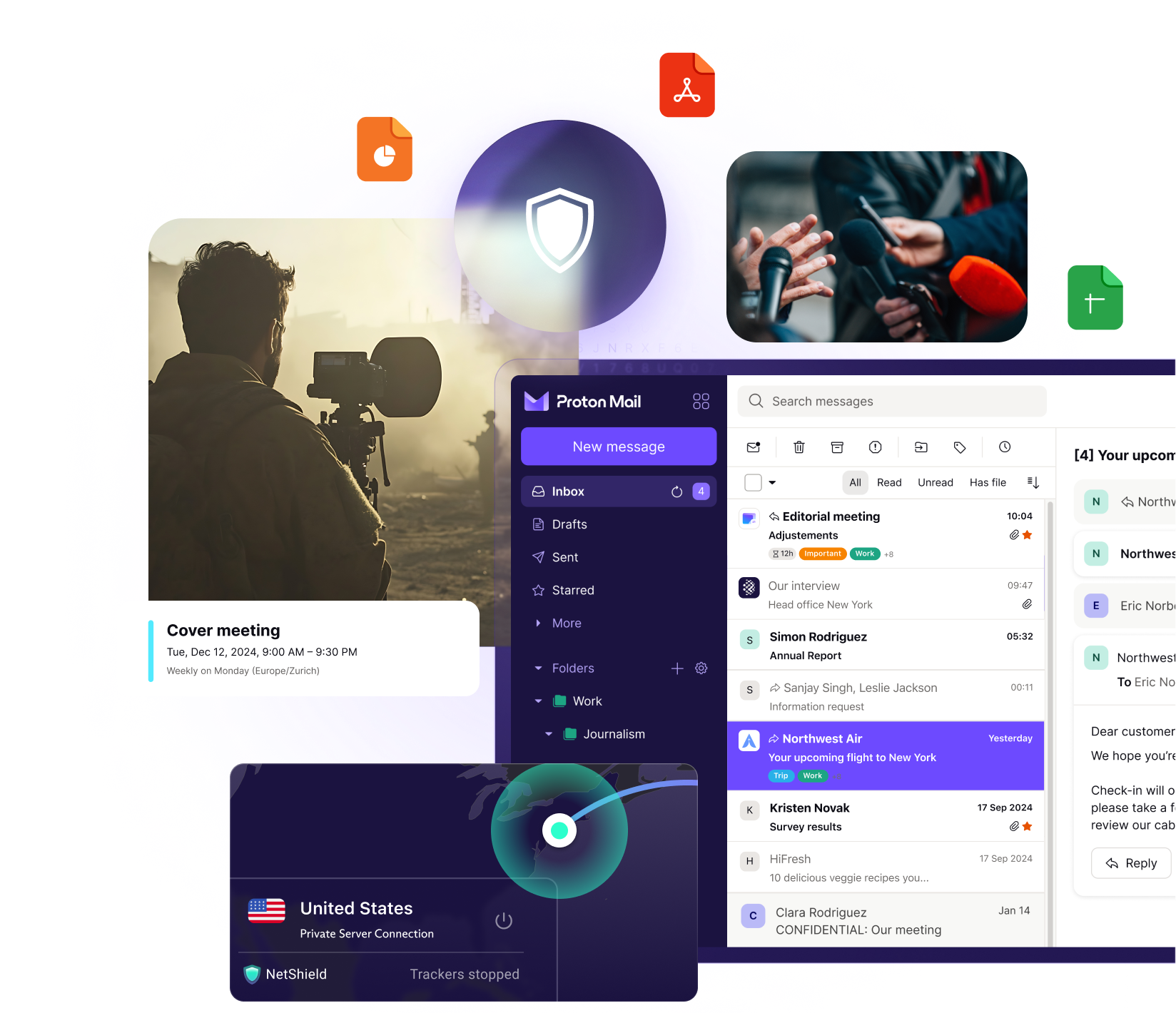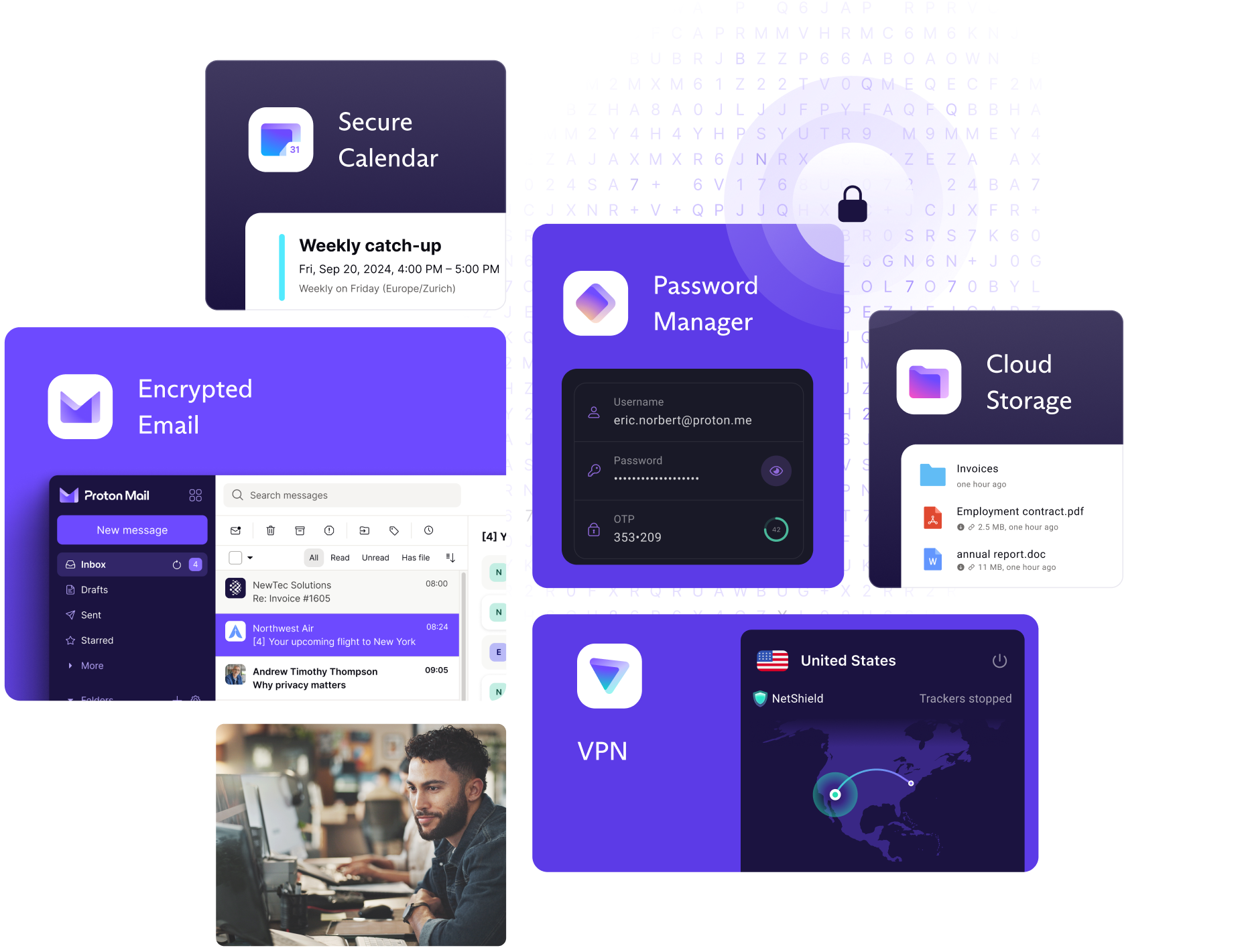Chroń wolność prasy z Proton
Dziennikarze są atakowani. Proton chroni Twoje e-maile, kontakty, dokumenty i inne dane za pomocą szyfrowania end-to-end, aby zapewnić bezpieczeństwo Tobie i Twoim źródłom.
Aktualizacja: aby przeciwdziałać bezprecedensowym zagrożeniom, oferujemy teraz zniżki na Proton for Business dla mediów informacyjnych.
Zalecane przez Reporterów bez Granic i cieszące się wszędzie zaufaniem dziennikarzy.

Opisano w

Proton pomaga dziennikarzom pracować bezpiecznie i komunikować się w sposób bezpieczny
Nasze silne szyfrowanie i jurysdykcja szwajcarska pozwalają Ci zachować kontrolę nad danymi przez cały czas. Ponieważ automatycznie stosujemy szyfrowanie end-to-end i szyfrowanie po stronie klienta, Twoje e-maile, wydarzenia w kalendarzu, pliki, dokumenty i hasła są chronione przed naruszeniami danych i inwigilacją. Jako szwajcarska firma nie możemy legalnie podporządkować się żadnym zagranicznym wezwaniom sądowym.
Co roku setki dziennikarzy są zabijane lub wtrącane do więzienia za swoją pracę. Tysiące kolejnych dziennikarzy spotyka inwigilacja, cenzura i strach przed odwetami ze strony władz rządowych lub grup ekstremistycznych. Naszą misją jest chronić Cię za pomocą zaawansowanych, ale łatwych w użyciu narzędzi cyfrowego bezpieczeństwa.
Jak Proton chroni dziennikarzy
Bezpieczeństwo Proton zaczyna się od szyfrowania end-to-end. Nikt – nawet Proton – nie może zobaczyć Twoich e-maili, wydarzeń kalendarza, plików ani innych danych przechowywanych na naszych serwerach.

Komunikuj się bezpiecznie z zespołem i swoimi źródłami
Proton Mail nie skanuje (i nie może skanować) Twoich e-maili ani nie udostępnia ich stronom trzecim. Niezależnie od tego, czy komunikujesz się z anonimowymi źródłami, czy zarządzasz poufnymi informacjami, tylko zamierzeni odbiorcy zobaczą Twoje wiadomości.

Bezpiecznie przechowuj i udostępniaj wrażliwe pliki
Od wskazówek sygnalistów po dokumenty badawcze – zaszyfrowana przestrzeń dyskowa w chmurze Proton Drive chroni Twoje pliki. Przeglądaj i udostępniaj ważne dane na różnych urządzeniach, wiedząc, że Twoje pliki są w pełni chronione przed nieautoryzowanym dostępem.

Współpracuj nad historiami za pomocą zaszyfrowanych dokumentów
Niezależnie od tego, czy robisz notatki, czy tworzysz szkic artykułu, Docs w Proton Drive to jedyny edytor dokumentów online, który pozwala uzyskiwać od innych użytkowników dane wejściowe i zmiany w czasie rzeczywistym, zapewniając przy tym pełne szyfrowanie end-to-end.

Odblokowuj treści i przeglądaj sieć prywatnie
Zapewniamy dziennikarzom VPN, któremu można zaufać. Proton VPN ukrywa Twój adres IP i szyfruje Twój ruch sieciowy, aby zapobiegać inwigilacji, blokować elementy śledzące i omijać cenzurę, umożliwiając Ci swobodne korzystanie z internetu w każdym miejscu.

Bezpiecznie zarządzaj hasłami i danymi logowania
Proton Pass chroni wrażliwe dane logowania Twojego zespołu przy użyciu szyfrowania end-to-end, zmniejszając ryzyko nieautoryzowanego dostępu lub naruszenia danych. Łatwo przechowuj i udostępniaj hasła do kont lub baz danych.

Zapewnij swojemu zespołowi zorganizowanie i terminowość
Nasz zaszyfrowany kalendarz zapewnia Twojemu zespołowi sposób na planowanie spotkań, udostępnianie linków wideo lub koordynację wywiadów ze źródłami z zachowaniem prywatności. Nikt nie widzi, gdzie jesteś ani co robisz, co zwiększa bezpieczeństwo Twojego zespołu.
Od ponad dekady angażujemy się w wolność prasy.
Od swojego powstania w 2014 roku Proton konsekwentnie wspiera niezależne dziennikarstwo na całym świecie. Poprzez naszą fundację non-profit Proton Foundation bezpośrednio wspieraliśmy organizacje medialne, w tym Charter’97, The Markup, Freedom of the Press Foundation oraz Fundusz Bezpieczeństwa Międzynarodowej Federacji Dziennikarzy.
Ulokowany w Szwajcarii
Jako szwajcarska firma nie możemy udostępnić nikomu Twoich danych bez ważnego nakazu szwajcarskiego sądu. Twoje dane są chronione przez surowe przepisy o prywatności i znajdują się poza jurysdykcją USA i UE.
Otwarte i transparentne
Nasze aplikacje mają otwarty kod źródłowy i są poddawane niezależnym audytom, dzięki czemu każdy może je zweryfikować i zaufać, że nasz kod jest bezpieczny. Przejrzystość to jedna z naszych podstawowych wartości.
Utrzymywani przez społeczność
Założona w 2014 roku w wyniku kampanii finansowania społecznościowego firma Proton pozostaje w 100% finansowana przez naszą społeczność, a nie przez kapitał wysokiego ryzyka ani reklamy.

Chroń swoją redakcję z Proton
Skorzystaj z naszej specjalnej oferty dla organizacji medialnych. Dostosuj swój plan do potrzeb i wielkości swojego zespołu.



